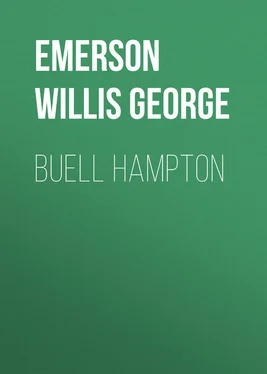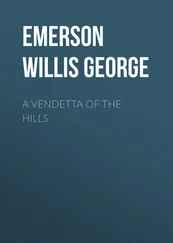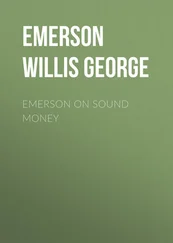Willis Emerson - Buell Hampton
Здесь есть возможность читать онлайн «Willis Emerson - Buell Hampton» — ознакомительный отрывок электронной книги совершенно бесплатно, а после прочтения отрывка купить полную версию. В некоторых случаях можно слушать аудио, скачать через торрент в формате fb2 и присутствует краткое содержание. Жанр: foreign_antique, foreign_prose, на английском языке. Описание произведения, (предисловие) а так же отзывы посетителей доступны на портале библиотеки ЛибКат.
- Название:Buell Hampton
- Автор:
- Жанр:
- Год:неизвестен
- ISBN:нет данных
- Рейтинг книги:5 / 5. Голосов: 1
-
Избранное:Добавить в избранное
- Отзывы:
-
Ваша оценка:
- 100
- 1
- 2
- 3
- 4
- 5
Buell Hampton: краткое содержание, описание и аннотация
Предлагаем к чтению аннотацию, описание, краткое содержание или предисловие (зависит от того, что написал сам автор книги «Buell Hampton»). Если вы не нашли необходимую информацию о книге — напишите в комментариях, мы постараемся отыскать её.
Buell Hampton — читать онлайн ознакомительный отрывок
Ниже представлен текст книги, разбитый по страницам. Система сохранения места последней прочитанной страницы, позволяет с удобством читать онлайн бесплатно книгу «Buell Hampton», без необходимости каждый раз заново искать на чём Вы остановились. Поставьте закладку, и сможете в любой момент перейти на страницу, на которой закончили чтение.
Интервал:
Закладка:
“You may be unduly prejudiced, Captain,” said Hugh.
“Well, possibly I am,” replied the captain, “one thing is certain, however, I am not a politician, and I manage, on account of our banking interests, to keep my views pretty close at home. At the same time, Stanton, an old, grizzled veteran like myself, who fought for four years for the preservation of the Union, is liable to be rather set in his political opinions.”
“While I do not agree with Major Hampton, politically,” observed Hugh, “yet otherwise I am very favorably impressed with him.”
“That’s right,” said Captain Osborn, “so am I. He is an amiable gentleman, always dresses immaculately, as you saw him this morning, and is noted far and wide for his deeds of charity and his kindness among the poor. If any are sick within twenty miles of Meade, Major Hampton knows all about it. He visits them, and takes care that they are properly provided with medical aid. He is a warm supporter of the Ladies’ Aid Society, and contributes most liberally to the different churches, although he evinces no preference for any particular creed. Indeed, he is quite popular, and, between ourselves, Hugh, I should not be a bit surprised if he told the truth about snowing us under at the polls this fall. You see the ‘Barley Hullers’ is a secret organization, and, therefore, an unknown quantity, and I have no doubt that the major will control it at the coming election, to a man.”
After banking hours that evening, Hugh called at the Patriot office. “Come in, Mr. Stanton,” cried the major, in most hospitable tones, as he ushered him into his own private “den.” Its moquette carpet, easy chairs, Turkish divan, beautiful pictures, and shelves well filled with books – all combined to make this little editorial “den” one of surprising elegance. The major had laid aside his Prince Albert coat for a smoking jacket.
“These are Congressional Records and works on political economy,” said he, waving his hand toward the book shelves, as he noticed Hugh looking at them. He lounged negligently on the divan, and threw one arm back carelessly over his head.
“You have quite an extensive library, Major,” observed Hugh, as he seated himself.
“My library is at my home,” replied the major, “these are but a few statistical volumes which I find necessary in writing editorials for the Patriot. There is hardly a recent work of a political nature published that is not represented on these shelves. By the way, Stanton, there are some pretty fair cigars in that box – help yourself.”
“Thank you,” said Hugh, as he lighted one.
Presendy the major arose from the divan, and, after lighting a cigar, observed, “By the way, Mr. Stanton, are you fond of books?”
“I certainly am,” replied Hugh, “they have been my best friends. Many hours of solitude have been beguiled by their pleasant and profitable companionship.”
“Of course you read novels?” said the major, inquiringly.
“I presume you regard it as a weakness,” replied Hugh, “but I must admit that a good novel has a great charm for me.”
“On the contrary,” replied the major, “I regard a good novel as healthful reading. The works of Scott, Thackeray, Dickens, Lytton, Victor Hugo, Hawthorne, J. Fenimore Cooper, and of many other novelists, may be read with profit. Some of our greatest historians have been novel readers, and some of our greatest novelists have clothed history with romance and made it immortal, thus diffusing historical facts far more widely than could have been done in any other manner.”
“I agree with you,” replied Hugh, “though I must admit that fiction has a general tendency to cultivate a dislike for more solid reading.”
They were interrupted by a knock at the door, and the major called out, “Come in!” The door opened and a tall, gaunt, rough-looking fellow came stalking in. The major, nastily rising from the divan, said:
“Why, hello, Dan, how do you do! Come right in. Mr. Stanton, allow me to introduce to you my friend Dan Spencer. Dan, this is Mr. Stanton, the new cashier of Captain Osborn’s bank. My friend, Spencer,” continued the major, “is one of our ‘horny handed sons of toil.’ He belongs to the big frontier army that is noted for having seen better days.’.rdquo;
The newcomer was, indeed, a study. He had exceedingly large feet and hands. Huge Mexican spurs were buckled to the heels of his high-topped boots. His small, restless, gray eyes and sandy hair were in keeping with his stubby red beard, large mouth, and sunburnt nose. It required no second introduction to discover that Dan Spencer regarded the major with reverential homage. Whenever he spoke, Dan had a habit of wambling and grinning, thereby disclosing his tobacco-colored teeth, and quivering like a creature in convulsions. The one noticeable feature about Dan Spencer was an abnormally long fanglike tooth, almost directly in front. This tooth protruded from the lower jaw, and when Dan spoke it wobbled about like a drunken man. Hugh fell to watching this tooth, and he fancied that every heavy breath on the part of its owner caused it to sway about like a willow buffeted by the wind.
After the introduction he said, addressing Hugh, “Waal, how do you like this ‘ere country?”
“Quite well, what I have seen of it,” replied Hugh.
“Don’t reckon you’ve seed much yit. You’ll find lots uv pore corn-juice, canned goods, ig’nance, and side-meat. I ‘spect the ig’nance, though, will nachally give way afore better brands of red liquor.”
Before Hugh could reply, Dan turned his wobbling tooth toward the major, and said:
“Hell is poppin’ agin, Major. I jist came in from No-Man’s-Land and I heerd that two hundred head uv old Horton’s fat beeves hed been stampeded, cut outer his herd an’ run off.”
“Great God!” exclaimed the major. “Stealing Horton’s cattle again? You don’t mean it!”
“You bet I surely do. The beeves are sure ‘nuff gone,” replied Dan. The major walked back and forth in an agitated way for several minutes, as if he were in deep thought. Presently, turning to Spencer, he said:
“Go down to the pasture and cut out the roan pony; also select a fresh one for yourself and be ready to start with me in a couple of hours.” Turning to Hugh he said, “My dear Mr. Stanton, you will have to excuse me. We go to press early to-morrow morning and I must write up this cattle robbery for the Patriot . You may not be acquainted with the conditions that exist on the frontier, but there are a lot of cattle thieves in this locality that must and shall, by the Eternal, be torn out root and branch. I must also ride over and see Mr. Horton this evening. Well, good-bye, Stanton, come to see me often.”
Hugh was profoundly impressed by the troubled look of the major, and, as he walked along the street toward the hotel, he shuddered as he thought of the vengeance that would be meted out to the cattle thieves if Major Buell Hampton should have the passing of judgment upon them.
He soon, however, dismissed all thought of the cattlemen and of their troubles, and, while softly humming an air from “Robin Hood,” began writing a letter.
CHAPTER VII. – THE CATTLE KING
HUGH STANTON had now been in Meade about a month, and was well pleased with his new position. Money poured in from the East for investment, and seemed as free as water among the people. Deposits continually increased in the bank, while the ruling rates of interest were very high. Investments were quickly turned and immense dividends declared and sent on to the Eastern capitalists, who in turn became intoxicated with the desire for more of these large profits, and consequently sent back their money for reinvestment. Not content with this, they borrowed to the full extent of their credit, at a low rate of interest, and sent on the funds for Western investment and speculation. Barley, wheat, and other cereals yielded enormously, and lands that had been purchased from the government at a dollar and a quarter per acre changed hands – within a year – at from thirty to forty dollars per acre in favored localities. Real estate in Meade that had cost original purchasers from fifty to one hundred dollars per lot sold readily at from one thousand to five thousand dollars each.
Читать дальшеИнтервал:
Закладка:
Похожие книги на «Buell Hampton»
Представляем Вашему вниманию похожие книги на «Buell Hampton» списком для выбора. Мы отобрали схожую по названию и смыслу литературу в надежде предоставить читателям больше вариантов отыскать новые, интересные, ещё непрочитанные произведения.
Обсуждение, отзывы о книге «Buell Hampton» и просто собственные мнения читателей. Оставьте ваши комментарии, напишите, что Вы думаете о произведении, его смысле или главных героях. Укажите что конкретно понравилось, а что нет, и почему Вы так считаете.












